Although the second season of Better Call Saul ended over a month ago, we still haven’t stopped talking about it. The first part of our conversation focused on what the show gets right about the legal profession. Today we focus on deconstructing what it means to “Call Saul” and how that is similar to and different from what it meant for Walter White to “Break Bad”.
Mild spoiler Alert for Seasons 1 and 2 of Better Call Saul and all of Breaking Bad. However, the discussion is mostly spoiler-free, so if you’re on the fence about watching either show, this article is a pretty good sales pitch for some of the big themes and ideas that make both shows compelling.
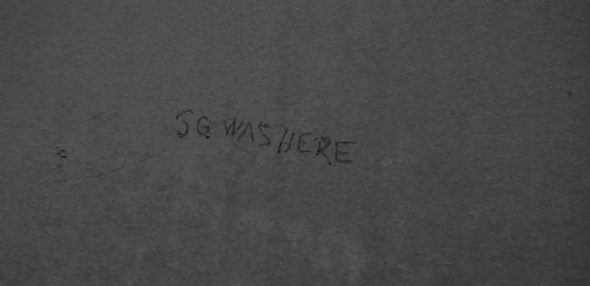
Ryan Sheely: I want to zoom in on this idea of “SG”— Saul Goodman having been there in the mall dumpster area. How do we see the presence or absence of “Saul Goodman” in this show, given that we’ve not actually seen Saul Goodman proper in this series, at least as he existed in Breaking Bad. The series itself shows Jimmy McGill, before he becomes Saul, and the flash forwards show the post-Saul deep cover identity.
But it strikes me that the graffito indicates that “SG was there” all along, that the latent Saulness is in Jimmy. We see flashes of that this season, more than in season 1, in the flair for the dramatic TV ads, the loud suits that he buys to get fired from Davis and Main, and in his ethical flexibility in his work related to Mike and the Salamancas.
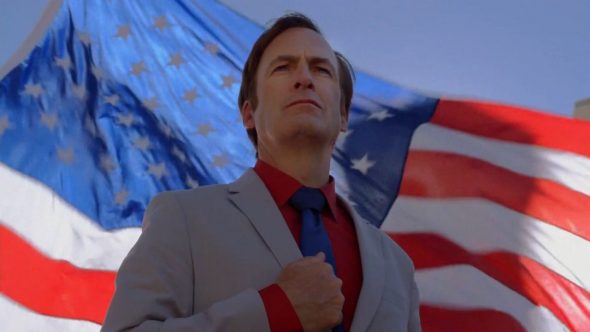
What do you guys make of “SG”’s presence and/or absence in this season? Is he there all along, and it is a matter of him getting the chance to shine, or are we seeing him be built bit-by-bit?
And is the “calling” of Saul in the title a similar phenomenon to “Breaking Bad” or is it fundamentally different?
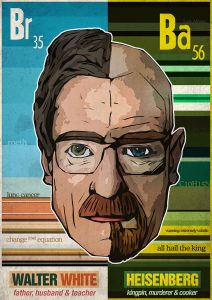 Pete Fenzel: I know my opinion in this isn’t universally shared, but I never bought into the common idea that “Walt” and “Heisenberg” on Breaking Bad were different people, and that one or the other would show up at different times. That’s how it would work in some stories about secret identities and transformations, but not Breaking Bad. Names don’t have that kind of epistemological power in the Breaking Bad oeuvre; names don’t change the nature of things, names are performed. They are subsequent to self-conception.
Pete Fenzel: I know my opinion in this isn’t universally shared, but I never bought into the common idea that “Walt” and “Heisenberg” on Breaking Bad were different people, and that one or the other would show up at different times. That’s how it would work in some stories about secret identities and transformations, but not Breaking Bad. Names don’t have that kind of epistemological power in the Breaking Bad oeuvre; names don’t change the nature of things, names are performed. They are subsequent to self-conception.
I think Better Call Saul is similar, and that you’re right that there were parts of “Saul” that were always there, or rather, that the person who is called Jimmy or “Called Saul” is the same person. He changes over time, but he’s still one guy.
Sheely: Yeah, it is almost like “Saul” is a name that he comes up with to explain to the world this thing that he has recognized in himself for a while. In the way that you put it, Heisenberg functions in a similar way.
The first appearance of the name Heisenberg is the episode where Walt meets Tuco, right?
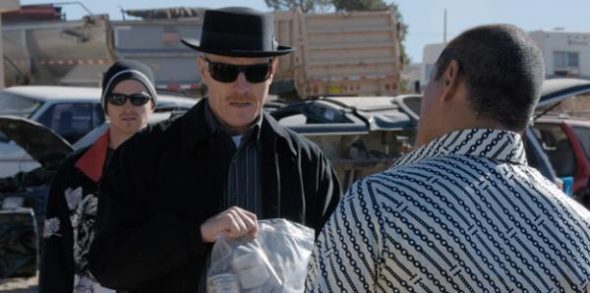
Fenzel: I think so, yeah. The names are things they want other people to call them, because they want to influence the behavior of other people.
Sheely: Yeah I was thinking of it as an exercise in branding, which also functions in that way.
Fenzel: And the universe is a bit Dantean, in that the choices people make and the things they do, while externally directed, are self-creating. Saul is creating his own Hell, but he’s doing it by how he acts on others.
Like just think about the name of a law firm using the name of a person. A law firm is not a person, but it is a way that a person exerts influence.
Sheely: And this is why the ad that Jimmy makes is such a big problem, right? Because he is exerting his influence using the Davis and Main name.
Fenzel: Exactly, he is using the name as a vehicle for his agency. It’s a usurpation more than a brand dilution.
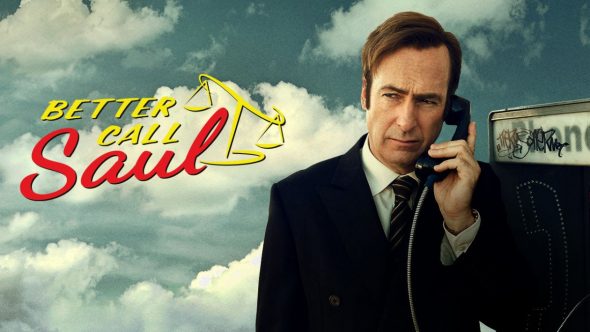
Fenzel: We can also sketch out all the things “Better Call Saul” as a phrase means, all in literary ambiguity with each other.
“You ought to get this guy’s help”
“If you want things to be better, contact this guy”
“Saul is a more appropriate way to name this guy”
“Let us learn how to name Saul more appropriately”
“Saul is not here now, but he is coming later”
Better means both “improved” and “ought”
Call means both “summon” and “contact” and “beckon through imitation” and “name”
And some part of the sentence is elided, so it has a lot of flexibility as to what it means depending on how you pronounce it or choose to believe it.
Oh, and “better” can also mean “superior” and it can mean “healed”
And it has a vibe similar to radio drama heroes and early superheroes, but also tawdry hucksterism. “Sham-Wow saved the day once again!!” Which is not a quote, by the way. Just an identification of a cultural moment.
This isn’t an exhaustive list, it’s just the stuff I think is relevant.
Richard Rosenbaum: We also shouldn’t ignore the most obvious symbolism, right? Heisenberg is most well known for his uncertainty principle, which translated into a non-scientific context can be seen to apply to Walt in that he can play at being both the good husband/father and the badass meth dealer – those identities can be in superposition – until he is “observed,” in other words, until the people who exist on one side of that identity become aware of his unstable duality and the waveform – and Walt – collapses.
Similarly, Jimmy McGill wants to be taken seriously but tries and fails to be both a good lawyer and a “good man.” It isn’t until he gives up on even trying to be a good man – when he becomes, ironically Saul Goodman – that he really comes into his own, a person who can be totally free of the expectations imposed on him by having that family name and the relationships that go along with it.
Fenzel: Well, keep in mind also that it is tricky to ascribe the observed properties of a particle in a waveform collapse to the agency of the particle. It seems mostly to be the agency of the observer (except for the various funky ways in which it is not). But when Jimmy/Saul “waveform collapses” to Jimmy or Saul, others feel more certain, at the moment, that they know something about him, but that relative certainty can be a false comfort, as there is still something unseen.
I would say that Jimmy doesn’t give up being a good man and then become Saul Goodman, he changes his ideas about ethics and family (and perhaps something else big happens), and he decides to call himself Saul Goodman sometimes, more often, or always, for reasons that matter in the moment.
There’s a feeling of triumph and release in the clarity of those moments, but that clarity is something of an illusion.
Sheely: Yeah that connects to the other meaning of “Better Call Saul”, which is the original ad and slogan from Breaking Bad:
In that context, calling Saul is something that happens out of need, maybe even out of desperation.
He’s been “Calling Saul” throughout the first two seasons in some of these moments, but it will interesting to see whether there is an additional big thing that happens that causes one of his own calls to stick a bit more.
Fenzel: Well, we know Kim isn’t in Breaking Bad. That’s the big shoe waiting to drop. We know Jimmy’s holding company that he later uses to launder money is named after his movie night with Kim Wexler and the con they pulled together.
I wonder if Kim is the one who will finally and authoritatively “Call him Saul”. Or if she will “Call Saul” and he won’t answer.
There’s also the “Saul” part. “Saul” means several things. For one, it’s a boorish caricature name for a Jewish professional of a certain older generation, which Jimmy clearly is not, but which he wants to be associated with as a lawyer because of his client’s preconceived notions about Jews being good lawyers and also unsavory. There’s no indication Jimmy shares that anti-Semitism (they’re good at specific things, but the things they are good at are not respectable), which is interesting. We still don’t know where he comes up with the name or why, but it is interesting that he chooses to come off as kind of an anti-Semitic symbol without ever seeming to share that sentiment at all, just because of the effect it has on people.
And that whole arc happens a bunch of times in Breaking Bad in various ways.
Sheely: There’s also New Testament Saul of Tarsus who becomes Paul the Apostle, which seems relevant to what we’ve been discussing with the relationship between name and identity.
Fenzel: Yep. Paul was Saul before his conversion on the road to Damascus, back when he persecuted Christians professionally.
So, there’s Saul the Jew, Saul the Anointed and Deposed King, and Saul the Guy Who Never Saw Truth/Light/Goodness.
Sheely: Well then there is the other sense that was mentioned on a flashback in season one, the jokey grifter pseudonym coming from the phrase “it’s all good, man”. Which is ironic because at the times at which you better call Saul, those are the times at which it is most decidedly not all good, man.
Fenzel: A 2001 New Yorker article on the phrase “It’s All Good” illuminates this a bit:
“Tupac Shakur employed the phrase in his hit ‘California Love,’ on which Dr. Dre announced, ‘Diamonds shinin’ lookin’ like I robbed Liberace / It’s all good from Diego to tha Bay.’ In such contexts, ‘It’s all good’ serves as a statement of defiance rather than complacency; things are clearly not all good, for example, if you happen to be Liberace.”
And this second quote from the same article is even more pertinent to the show. Cope here is Stephen Cope, a yogi and writer of yoga books: “Cope said that although he believes Americans often need a corrective to an embedded Puritan world view—which might be characterized as ‘It’s all bad, especially you’—the phrase does, nonetheless, raise his hackles. ‘There is a way in which that mantra can lead to a fatalistic view of life, and can leave out the incredible power of choice,’ he said.”
It is worth noting that “California Love” does not say Dr. Dre has *actually* robbed Liberace. It is merely that the jewels bear some passing resemblance in their gleam and abundance. And my client Dr. Dre would surely not tolerate any further interference with his personal effects or place of business related to this baseless accusation, thanks to a little thing called THE CONSTITUTION.
Sheely: The other important hip hop connection to “It’s all good” is “Juicy” by the Notorious B.I.G. “It’s all good, baby baby”
Fenzel: If Saul Goodman were affiliated with a rap faction, would it be East Coast or West Coast?
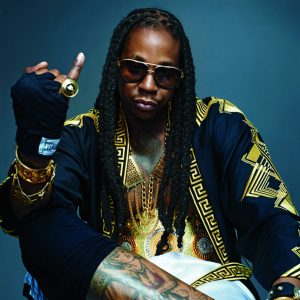 Sheely: If Saul Goodman were affiliated with a rap faction, he’d be from the South. I think he’d find the East/West dichotomy restrictive and would hustle to carve out his own niche, defying the established rules. I’d also say that the early 2000s setting of Better Call Saul also clearly aligns it with the rise of southern hip hop. I’d say that 2 Chainz is probably the best rapper analogue for Saul Goodman… he changed his business name (from Titty Boi to 2 Chainz), is a strong advocate of grinding out hard work to get ahead, and has a flamboyant sense of personal style and a sense of humor.
Sheely: If Saul Goodman were affiliated with a rap faction, he’d be from the South. I think he’d find the East/West dichotomy restrictive and would hustle to carve out his own niche, defying the established rules. I’d also say that the early 2000s setting of Better Call Saul also clearly aligns it with the rise of southern hip hop. I’d say that 2 Chainz is probably the best rapper analogue for Saul Goodman… he changed his business name (from Titty Boi to 2 Chainz), is a strong advocate of grinding out hard work to get ahead, and has a flamboyant sense of personal style and a sense of humor.
Fenzel: A final connection is that Saul is also the King of Israel who is deposed by David (David, of the House of Jesse, ‘natch). And that works with the character in two ways: for one, he is anointed by the prophet Samuel kind of arbitrarily. God just says “this random guy should be in charge,” and that’s the way it is; he overthrows the Philistines. This meshes with the idea that Jimmy never really asked for any of this to happen, and even in Breaking Bad he never seemed to have sought out his specific circumstances, he always just ends up being the anointed guy. But he is, without question, the king of what he is.
The other way is that King Saul gets gradually undermined and then railroaded by King David in, again, kind of an unfair and arbitrary way. They were friends, and Saul was the guy in charge, but then David starts doing all this increasingly awesome stuff, and Saul’s son Jonathan (he of “Absalom, Absalom!” fame) is best friends with David, but when David slew Goliath, it became clear David was eventually going to usurp them, and so Saul got increasingly hostile and desperate, and finally the same prophet who anointed him is like “You suck and you’re not king anymore and you’re getting killed tomorrow.”
Rosenbaum: The last straw that made God send the Prophet Samuel to revoke Saul’s kingship and give it to David instead was that Saul disobeyed God’s command to destroy the Amalekites (a Canaanite tribe known for child sacrifice) – Saul left the Amalekite king alive, and took their flocks. Saul spared his fellow king, and as a result, hundreds of years later, the Amalekite king’s descendant, Haman, rose to power in the Persian Empire and nearly wiped out the Jewish people (as described in the Purim story).
Basically, Saul lost his power because he was unwilling to do something necessary yet maybe let’s say distasteful. Jimmy McGill, notably, is not above doing what he thinks is necessary regardless of how it may seem to others. He has his own moral code that sees longterm results as more important than adherence to, you know, laws.
Fenzel: In other words, NO MORE HALF MEASURES.
Sheely: Speaking of “half measures”, the one character we haven’t talked about at all is Mike. How do you see his arc connecting to the other characters and stories this season?
At the most surface level, there are occasional connections, where he pulls Jimmy in to help with specific legal entanglements with the Salamancas. And of course, the Salamanca family is where you see the biggest connection to Breaking Bad.
But beyond these narrative connections, Mike’s story is pretty separate from Jimmy’s. How do you guys think his story is operating throughout the season in terms of what we’ve been discussing here? Or is it operating in a totally different way?
Fenzel: So, just in case people aren’t up to speed on this, even though it’s been on the internet for a while, we should put the hidden message in the episode titles out there, as what they say has a huge impact in particular on Mike’s plot.
Switch
Cobbler
Amarillo
Gloves Off
Rebecca
Bali H’ai
Inflatable
Fifi
Nailed
Klick
The “k” in “Klick” is a clue something is up here and there’s a puzzle to solve. Rearrange the titles like so:
*F*ifi
*R*ebecca
*I*nflatable
*N*ailed
*G*loves Off
*S*witch
*B*ali H’ai
*A*marillo
*C*obbler
*K*lick
“FRING’S BACK”
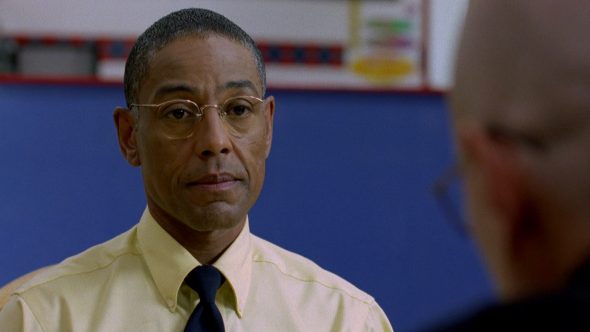
Fenzel: Vince Gilligan has played puzzle games with episode titles before, like how the names of every episode in Season 2 of Breaking Bad that began with a weird flash-forward spelled out the name and location of the plane crash at the end of the season.
There were teases for a long time before and during this season of Better Call Saul that a major character from Breaking Bad was going to show up by surprise this season, and it didn’t end up happening. It’s clear from the episode titles that this character was supposed to be Chilean chicken/meth magnate Gus Fring. Just as we know Jimmy McGill will eventually become Saul Goodman, we know Mike Ehrmantraut will eventually become Gus Fring’s second-in-command and enforcer before the events of Breaking Bad start. It seems from the episode titles and the past use of episode title puzzles by Gilligan and co that Gus was supposed to show up in the final episode, giving some clarity and sense of satisfaction to Mike’s arc this season, which has been pushing him in that direction.
Instead, we get the “DON’T” note, which isn’t quite as clear, but serves well enough as a big twist that re-contextualizes the purpose of everything that has happened to Mike and the meaning of what Mike has chosen to do in the context of the story all season.
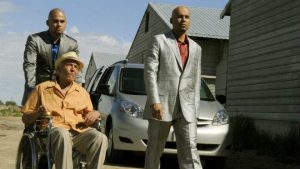 From what I’ve read, the issue was they “couldn’t make it work” – which sounds like it was a budgetary or actor availability issue to get Giancarlo Esposito when they shot that episode. Well, I should add, it’s not like we didn’t get any surprise returning characters. We got Tio and the Cousins, which was pretty cool. But we were supposed to get Gus, I’m pretty sure, and we didn’t. What isn’t clear is whether they will be able to make it work next season, and if further availability issues means the character choice will change.
From what I’ve read, the issue was they “couldn’t make it work” – which sounds like it was a budgetary or actor availability issue to get Giancarlo Esposito when they shot that episode. Well, I should add, it’s not like we didn’t get any surprise returning characters. We got Tio and the Cousins, which was pretty cool. But we were supposed to get Gus, I’m pretty sure, and we didn’t. What isn’t clear is whether they will be able to make it work next season, and if further availability issues means the character choice will change.
But, I think whether you figure out the acronym or not, and whether the actor availability issue is there or not, or however they decide to go next season, I read the “DON’T” note at the end of Season 2 of Better Call Saul as coming from Gus Fring, either directly or though an associate, based on the standalone material we have right now from both series. Did you guys also read it that way? Do you think that’s a clear enough consensus to inform analysis?
Sheely: I think that the mystery and the failure to pay off the “big surprise” actually connects really well to what is going on thematically in Mike’s story. Throughout this season, we see Mike working methodically to set up these elaborate plans to fight against Tio and the Salamanca family. He deploys the carbon-paper doormat, the garden hose road spike, the Tuco-baiting scuffle, and eventually the grassy knoll sniper plan. All of these have a mentality that is similar to the level of detail that is necessary to untangle a acronym/acrostic like “FRING’S BACK”. But it is noteworthy that none of these schemes work as planned, and that each hiccup ends up enmeshing Mike more and more deeply with the Salamancas (and now, possibly with Gus). Rather than leading to a perfect, clean resolution, Mike’s attempts to control the situation through problem solving only serve to draw him in deeper. This is how it works with fans of Breaking Bad and Better Call Saul as well. Even though the legions of Reddit sleuths cracked Gilligan’s code, they didn’t get the fulfillment they wanted, upending their expectations and putting them on unstable footing very similar to Mike’s as they head into Season 3.
What other similarities and differences do you see between Better Call Saul and Breaking Bad? Are there other meaning of “Calling Saul” that you have noticed? Have you found any other codes and mysteries in this season? Let us know in the comments!
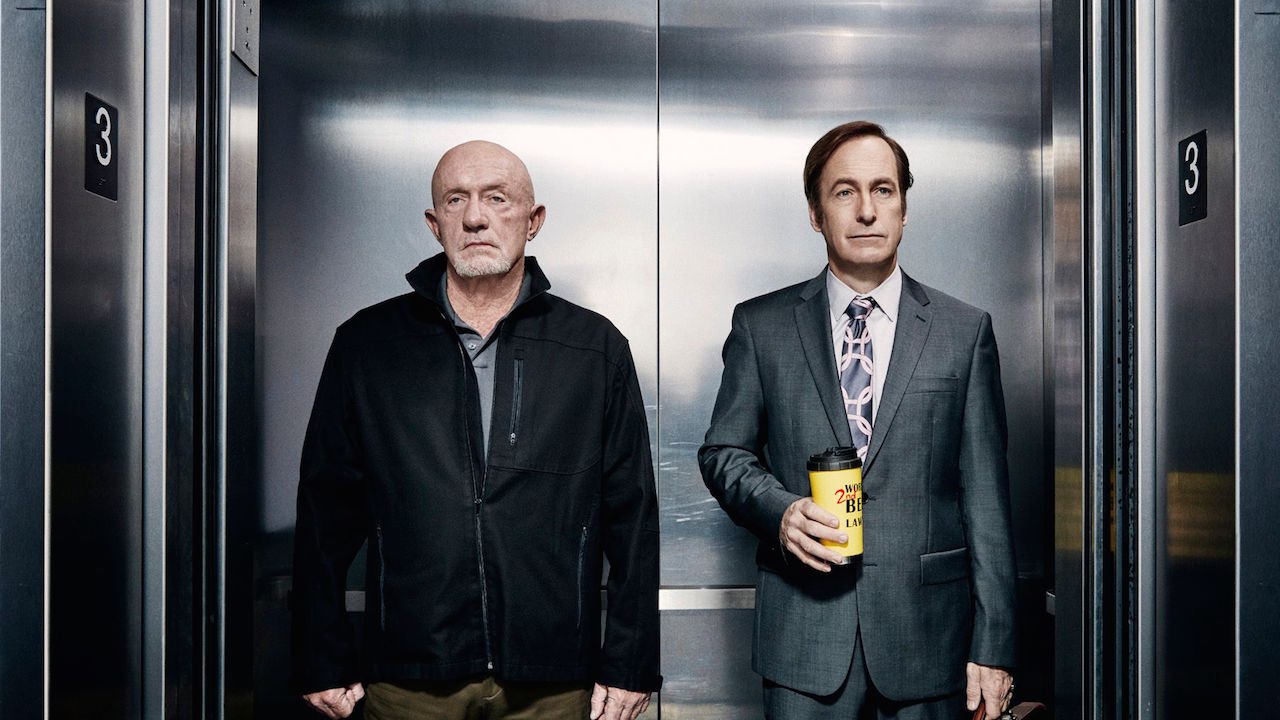
You might the difference, if you can identify their “Dowton Abbey Moment” for their respective shows. I couldn’t place one for Better Call Saul, but there is one for Breaking Bad.
Early in the series, Walter White explains thalidomide chirality to his students. It’s the concept that a molecule has different forms but nearly identical looks. It’s the Mr. Chips, Scarface dichotomy.
Maybe Better Call Saul’s moment lies in the Cinnabon. Sweet and filling when eaten sparingly. But downright deadly if that’s all you eat.
I really like Better Call Saul but I cannot stand the constant references to Breaking bad. Breaking Bad was a good show. Some say great. I say good. Either way, it’s over. It happened. And the early seasons happened a long time ago. I do not remember the characters from the early seasons.
I love Jimmy/Saul because he’s a sympathetic and fun character, and I watch the show because I love Jimmy. I’d really rather they did away with the BB references. They are much too winky and they don’t move the plot along in a meaningful way. I’m sure the BB fans are glad to see them. But what of the fans of Saul? I know we’re out there, and I know we’re tired of BB nostalgia holding us back.
Just as Jimmy cannot get away from his brother’s expectations, BCS cannot get away from the BB audience’s expectations. Is BCS the Jimmy of Breaking Bad? I guess that makes Breaking Bad Chuck. This analogy might need work, but there’s something here.